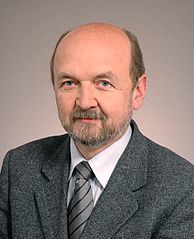Ryszard Legutko
Born
in Kraków, Poland
December 24, 1949
Website
Genre
Influences

|
The Demon in Democracy: Totalitarian Temptations in Free Societies
—
published
2012
—
18 editions
|
|

|
The Cunning of Freedom: Saving the Self in an Age of False Idols
—
published
2021
—
2 editions
|
|

|
Esej o duszy polskiej
—
published
2008
—
4 editions
|
|

|
Sokrates. Filozofia męża sprawiedliwego
—
published
2013
|
|

|
Society as a Department Store: Critical Reflections on the Liberal State
—
published
2002
—
3 editions
|
|

|
Raj przywrócony
—
published
2005
|
|

|
Filozofia presokratyków. Od Talesa do Demokryta
—
published
2020
|
|

|
Złośliwe demony
—
published
1999
|
|

|
Spory o kapitalizm
by
—
published
1994
|
|

|
Polska, Polacy i suwerenność
|
|
“Captured by the ideological animus, both socialist and liberal-democratic art abandoned the criterion of beauty - considered anachronistic and of dubious political value - and replaced it with the criterion of correctness.”
― Triumf człowieka pospolitego
― Triumf człowieka pospolitego
“…egalitarianism and despotism do not exclude each other, but usually go hand in hand. To a certain degree, equality invites despotism, because in order to make all members of a society equal, and then to maintain this equality for a long period of time, it is necessary to equip the controlling institutions with exceptional power so they can stamp out any potential threat to equality in every sector of the society and any aspect of human life: to paraphrase a well-known sentence by one of Dostoyevsky’s characters, ‘We start with absolute equality and we end up with absolute despotism.’ Some call it a paradox of equality: the more equality one wants to introduce, the more power one must have; the more power one has, the more one violates the principle of equality; the more one violates the principle of equality, the more one is in a position to make the world egalitarian.”
― Triumf człowieka pospolitego
― Triumf człowieka pospolitego
“The ideological man is thus both absolutely suspicious and absolutely enthusiastic. There seems to be no idea under the sun that he would not put into question and make an object of derision, skepticism, or contempt, no idea that he would not reduce to an offshoot of hidden instincts, mundane interests, biological drives, and psychological complexes. Hence he is likely to despise reason as an autonomous faculty, to downgrade lofty ideals, and to debunk the past, seeing everywhere the same ideological mystification. But at the same time, he lives in a constant state of mobilization for a better world. His mouth is full of noble slogans about brotherhood, freedom, and justice, and with every word he makes it clear that he knows which side is right and that he is ready to sacrifice his entire existence for the sake of its victory. The peculiar combination of both attitudes--merciless distrust and unwavering affirmation--gives him an incomparable sense of moral self-confidence and intellectual self-righteousness.”
― The Demon in Democracy: Totalitarian Temptations in Free Societies
― The Demon in Democracy: Totalitarian Temptations in Free Societies
Topics Mentioning This Author
| topics | posts | views | last activity | |
|---|---|---|---|---|
| Challenge: 50 Books: Jonathan Brown's 90-Book Challenge for 2020 | 64 | 65 | Dec 26, 2020 05:43PM |
Is this you? Let us know. If not, help out and invite Ryszard to Goodreads.































